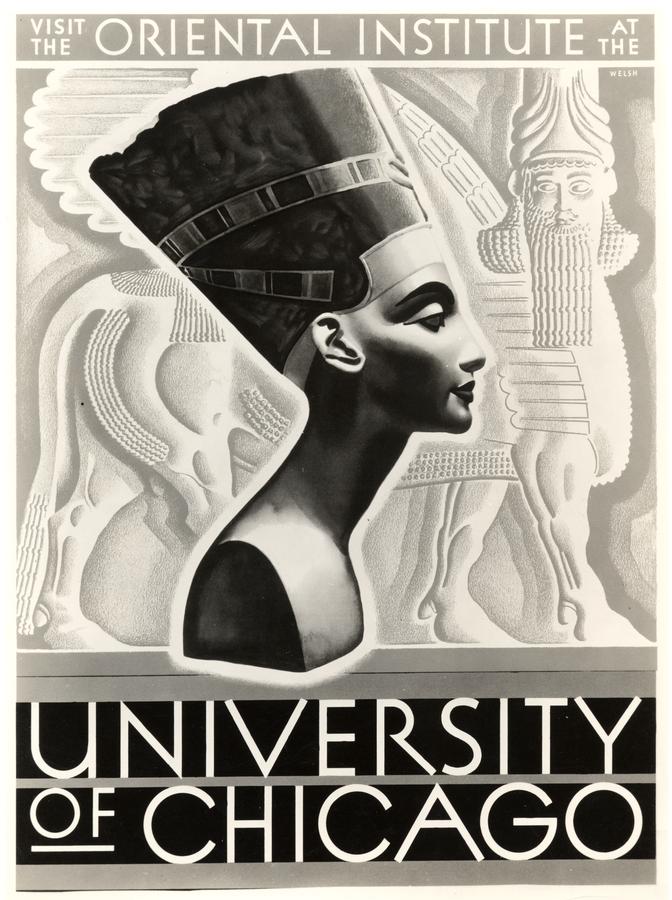Signs and Wonders upon Pharaoh: A History of American Egyptology
by John A. Wilson
Chicago: University of Chicago Press, 1964
Pp. xxv + 243; 32 plates
The whole book is worth reading, essential reading really for anyone interested in Egyptology or the Oriental Institute.
The following passage, on the education and early career of James Henry Breasted will give you a sense of the flavor of the book:
A HONEYMOON WITH A NOTEBOOK
Now we approach a mystery. With the gradual growth of the American interest in ancient Egypt, it might have been predicted that the retrospective atmosphere of New England or the cloistered halls of Harvard or of Pennsylvania would have produced the first professional American Egyptologists. In point of fact, both Breasted and Reisner came from Middle West homes of modest means. That the Corn Belt brought forth such exotic flowering was a historical accident which cannot be explained. In the case of each man there was a logical progression of career toward a goal which could not be foreseen in advance.
James Henry Breasted was the son of parents whose means had been reduced by the Chicago Fire of 1871. The generosity of a friendly "aunt" helped in his education. For a time he moved toward a career as a prescription druggist but suddenly felt a call to the ministry and enrolled at the Chicago Theological Seminary. Here he developed an unexpected gift for language. When he won a prize for Hebrew without a mistake in
written and oral examinations, his career took a new and decisive bent. He went to Yale in 1890 to study under the brilliant and dynamic William Rainey Harper. At that time much of American education stood in vast awe of a Ph.D. degree from a German university. That was felt to be a crowning certification of scholarly ability. Toward the end of the year at Yale, Breasted confided to Harper that he wanted to study Egyptology in Germany, since there was no chair in that subject in the United States. Harper, who was then planning the shape of a new university, responded with vigor: "Breasted, if you will go to Germany and get the best possible scientific equipment, no matter if it takes you five years, I will give you the professorship of Egyptian in the new University of Chicago!" Breasted's devoted parents and "aunt" found the means, and in the autumn of 1891 Breasted went to study hieroglyphic and Coptic under Adolf Erman at Berlin, with Hebrew and Arabic under other professors. He proposed to live on $40 a month. Despite deep concentration on his studies, he was not unaware of the outside world. In the autumn of 1893 he became engaged to the stately Miss Frances Hart of San Francisco, a young woman who was studying at the Home School for American Girls in Berlin.
Breasted won his Ph.D. in Egyptology cum laude in July, 1894, married Frances in October, and the young couple set off immediately for a honeymoon in Egypt. The kindly Erman had seen how nervously exhausted the young American was and suggested the trip to Egypt, both for Breasted's scholarly future and his health. Erman added that Breasted could help the new Berlin Dictionary by collating some inscriptions in Egypt. The proud "aunt" once more came forward with expense money. And a letter from President Harper advised the young Ph.D. that he had been appointed Instructor in Egyptology at a salary of $800 a year. The sum was disappointing. Married life and the responsibilities of a career at that rate of pay were rather alarming, but after all, this was the first teaching position in Egyptology in the United States. Surely the Lord would continue to provide.
This was nearly the first chair of Egyptology in the English-speaking world. France and Germany had long maintained the teaching of Egyptian, but in England it was only in 1894 that Miss Edwards founded the professorship for Petrie at the University of London. Griffith did not receive the first professorship of Egyptology at Oxford until he was sixty-two years old. In the United States, Reisner was appointed to the Harvard staff in the middle 1900's, and a German scholar, W. Max Müller, served the University of Pennsylvania from the end of the 1890's. Universities were slow to recognize Egyptology as a proper academic subject...
Go! Read the rest of the book. It's free and easy!





 Stumble It!
Stumble It!


No comments:
Post a Comment